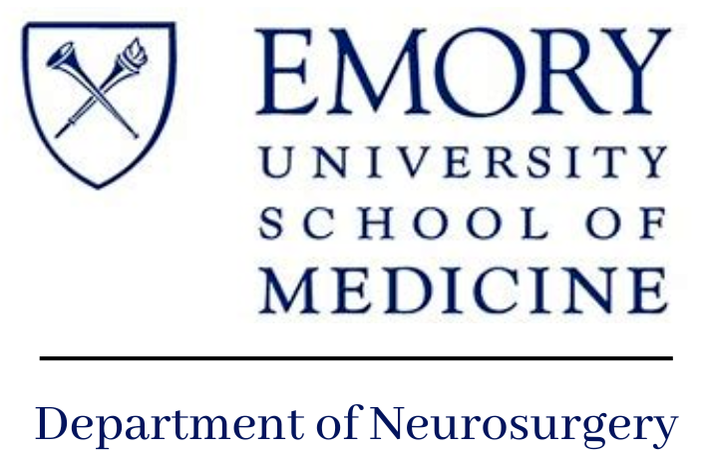|
Authors: Zachary L. Bernstein, BS and Jonathan A. Grossberg, MD Introduction The Department of Neurosurgery at Emory University is uniquely positioned to offer residents an unrivaled training experience in patient care, surgical excellence, and clinical and basic science research. Located in Atlanta, Georgia, the Department of Neurosurgery serves six different clinical sites: Emory University Hospital, Emory University Hospital – Midtown, Emory Saint Joseph’s Hospital, Children’s Healthcare of Atlanta – Egelston, Children’s Healthcare of Atlanta – Scottish Rite, and Grady Memorial Hospital. Residents train under the mentorship of world-class faculty that span across every neurosurgical subspecialty. The current residency program is led by Program Director Jonathan A. Grossberg, MD and Associate Residency Program Director Matthew F. Gary, MD. The department is championed by Chairman Daniel L. Barrow, MD. The program is expanding this coming year to accept 4 residents per year for an eventual total of 28 residents over 7 years. Emory’s residency program is the only ACGME accredited neurosurgery program in Atlanta. It is highly competitive and consistently ranks among the top programs in the country. The ACGME core competencies are honed at Emory through a rigorous training curriculum that values the resident as a vital member of the neurosurgical team. In addition to the core curriculum and requirements (detailed below), Emory prioritizes resident passions and aspirations, and aims to cater to the interests of each resident. This is exemplified through the specific academic tracks offered in cerebrovascular, functional, neuro-critical care, neuro-oncology, and spine. The requirements and structure of each academic track can be found here: https://med.emory.edu/departments/neurosurgery/education/academic_tracks/index.html.1 Furthermore, past residents have completed degrees while in residency—MBA, MSCR, MPH—or have taken dedicated time to conduct research at prestigious locations such as the NIH. Residents are encouraged to personalize their training during their elective and research years to suit their individual career goals. Program Overview Broken Down by Year PGY1 is dedicated to neurosurgery, neurology, and neurocritical care. Through this first year, residents will become proficient in five critical beside procedures: external ventricular drain placement, lumbar drain placement, lumbar puncture, central line placement, and arterial line placement. First-year residents will focus on basics in the care of neurosurgical patients as well as assisting on a wide variety of neurosurgical operative cases. PGY2 is hallmarked by an entire year at Emory University Hospital (EUH) where residents work as team members of the neurosurgical service. At EUH, residents will manage the service and play a critical part in team decision-making during rounds. The residents will then attend cases in the operating room that day that cover the entire gamut of neurosurgical disease from functional and peripheral nerve to tumor and cerebrovascular. Furthermore, residents are responsible for all consults and admissions from the emergency room or transfer service. PGY3 features 8 months at Grady Memorial Hospital and 4 months on the busy endovascular service at Emory. At Grady—a public safety net hospital and one of the busiest and largest Level I trauma centers in the nation—trainees will hone their surgical skills and begin to learn how to operate independently under direct supervision of attendings. PGY4 is halved with 6 months of pediatric neurosurgery at both Scottish Rite and Egleston hospitals—the busiest pediatric neurosurgery service in the country, as well as six months at Emory University Hospital – Midtown focused on spine and skull base services. PGY 5-7 are set up for a personalized combination of electives, research, and chief residency. Each resident will design a curriculum with their mentors to best suit their future career goals. There is an option for a PGY-6 chief year with a PGY-7 enfolded fellowship. In the research realm, residents lead their own research projects and can find collaborations throughout all related departments at Emory, Georgia Tech, and the CDC. More information regarding research infrastructure and opportunities at Emory are outlined below. The chief residency years sees residents assuming even more responsibility and overseeing the care of all neurosurgery patients, as well as the management of junior residents and the entire neurosurgical service. Chief residents will assign junior residents to cases and serve as mentors and teachers to them. Per Emory Neurosurgery’s website: “by completion of the chief resident year, the resident should be proficient in all commonly performed intracranial procedures and microsurgery, treatment of traumatic brain lesions, CSF-diversion techniques and surgical treatment of intracranial infections. The resident should be proficient in a variety of spinal operations for degenerative, traumatic, infectious and neoplastic disease. This includes basic knowledge and skill in spinal instrumentation, as well as basic skills in the management of common pediatric disorders”.2 Research and More Emory Neurosurgery faculty are world-renowned experts in their fields of research and welcome collaborations with trainees. The labs housed within Emory Neurosurgery are: Laboratory of Translational Neurosurgical Oncology (PI: Jeffrey Olson, MD), Gene and Cell Therapy for Neurorestoration Laboratory (PI: Nicholas Boulis, MD and Nick Au Yong MD), Skull Base Research Laboratory (PI: Gustavo Pradilla, MD and Tomas Garzon, MD), Cerebrovascular Research Laboratory (PI: Jonathan Grossberg MD, Brian Howard MD) Translational Neuro-Engineering (Bob Gross, MD PhD), Neuro-Oncology and Robotics (Kimberly Hoang, MD), Traumatic Brain Injury (PI: David Gimbel), and The Emory Brain Tumor Immunotherapy Laboratory (Edjah Nduom, MD). Many other faculty also spearhead productive and inclusive clinical and basic science research groups. As a resident at Emory, there may also be opportunities to collaborate with investigators at the many research centers within Emory or externally around Atlanta: Center for Disease Control (CDC), Yerkes National Primate Center, Winship Cancer Institute, Georgia Tech, and more. Trainees are encouraged to publish at least one peer-reviewed research article per year after their PGY1 year. Emory’s residents have a proven track record of high-quality research output. Grand rounds and specialty conferences are chances to discuss up-to-date trends, complex clinical cases, and research within the field. Grand rounds are held weekly and are led by chief residents, while specialty conferences are held on a weekly or monthly basis. These conferences often feature visiting guest professors. The annual Tindall Lecture Series, named in memorial of Emory’s first Chairman, Dr. George T. Tindall, features an invited distinguished guest lecturer once per year. A list of the past guest speakers can be found here: https://med.emory.edu/departments/neurosurgery/education/conferences/tindall_lecture.html.3 Residents and faculty also provide wonderful mentorship to medical students and other students at Emory. There is an inclusive and encouraging culture of multi-level education and mentorship at Emory. The Cerebrovascular Clinical Research Group, led by Dr. Brian Howard and Dr. Jonathan Grossberg, as well as the Central Nervous System Tumor Outcomes Registry at Emory (CTORE) group spearheaded by Dr. Kimberly Hoang are two groups, amongst others, that host numerous residents and medical students. Medical students may also participate in weekly journal clubs led by Dr. Cory Adamson and the Neurosurgery Student Interest Group. Program History In 1919, Charles Edward Dowman Sr., MD became the first professor and chief of Neurosurgery at Emory University. In 1947, Emory’s Neurosurgery residency program was first developed at the VA hospital in Chamblee by George Perret. In 1948, the program would shift to being stationed at Emory University Hospital and Grady Memorial hospital. In 1991, departmental status was granted to Neurosurgery within the Emory University School of Medicine and Dr. George Tindall was named as the first Chairman of the Department of Neurosurgery. Dr. Tindall was succeeded by Daniel L. Barrow, MD in 1995 who continues to lead the department today. Atlanta Training at Emory means training in Atlanta. Still, Emory attracts patients from all corners of Georgia and throughout the greater country. Atlanta is one of the most diverse cities in America and home to approximately 6 million people in the greater metro Atlanta area. At Emory, neurosurgery residents will serve patients spanning across the entirety of the socioeconomic spectrum and across various ethnocultural backgrounds. Atlanta is a city that celebrates black excellence with a rich history of black culture, including sites like the National Center for Civil and Human Rights and Martin Luther King, Jr. National Historical Park, amongst others. The cultural celebration in Atlanta can be felt by the colorful array of artwork found throughout the city on the sides of buildings and public infrastructure. Atlanta is affectionately known as the “city in a forest”. While downtown and midtown Atlanta are home to skyscrapers that fit the mold of an urban metropolis, Atlanta is surrounded by beautiful neighborhoods with colorful forests and lush greenery. With Piedmont Park as its most iconic, Atlanta is home to dozens of public parks and recreational centers. As such, there are plentiful opportunities for outdoor activities—running, biking, hiking, camping—in and around Atlanta. Furthermore, the weather permits for nearly year-round outdoor activities. In addition to beautiful nature, Atlanta is well known for having great food, sports, and music. References: 1.“Academic Tracks”. Emory University School of Medicine Department of Neurosurgery. https://med.emory.edu/departments/neurosurgery/education/academic_tracks/index.html 2.“Rotations”. Emory University School of Medicine Department of Neurosurgery. https://med.emory.edu/departments/neurosurgery/education/residency/rotations.html 3.“Tindall Lecture”. Emory University School of Medicine Department of Neurosurgery. https://med.emory.edu/departments/neurosurgery/education/conferences/tindall_lecture.html Conflicts of Interest: The authors report no conflicts of interest concerning the material or methods used to develop this manuscript. Acknowledgements: No acknowledgements. Brain & Spine Report Medical Student Neurosurgery Training Center Comments are closed.
|
Categories
All
Archives
October 2023
|





12/28/2022